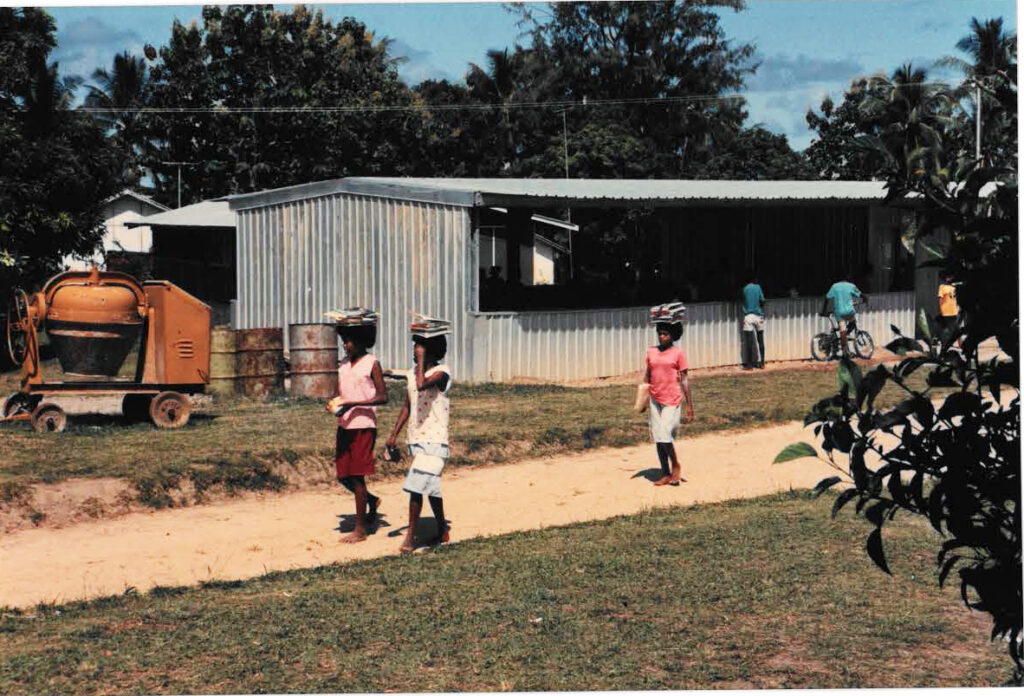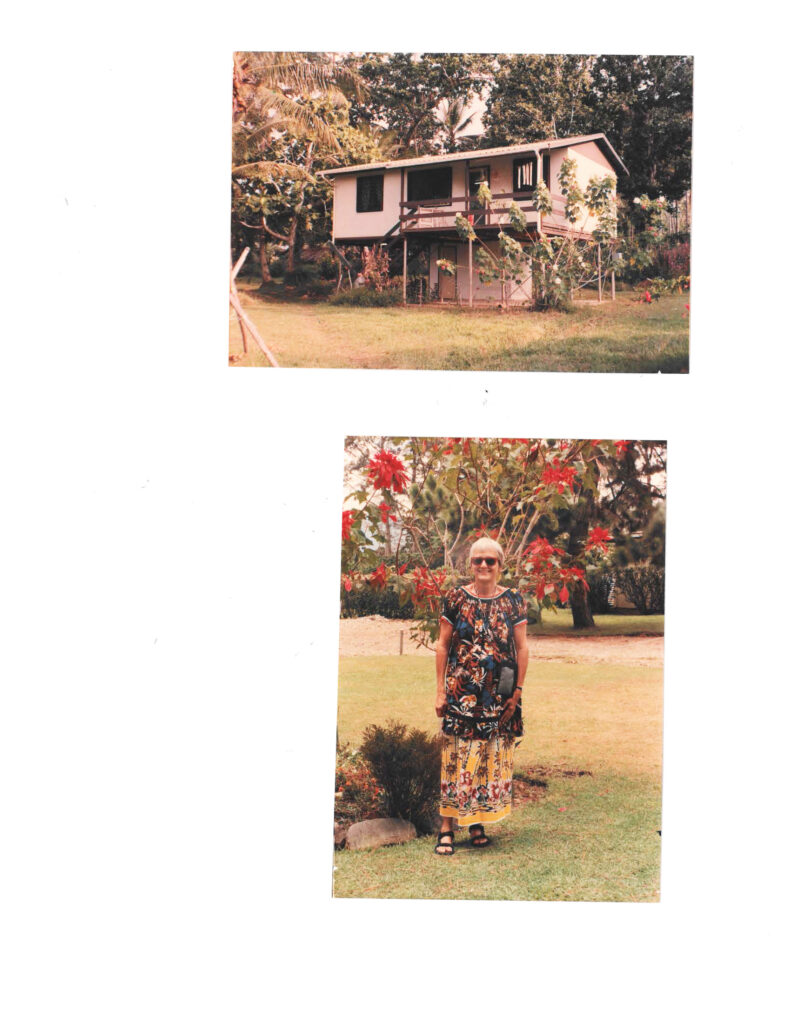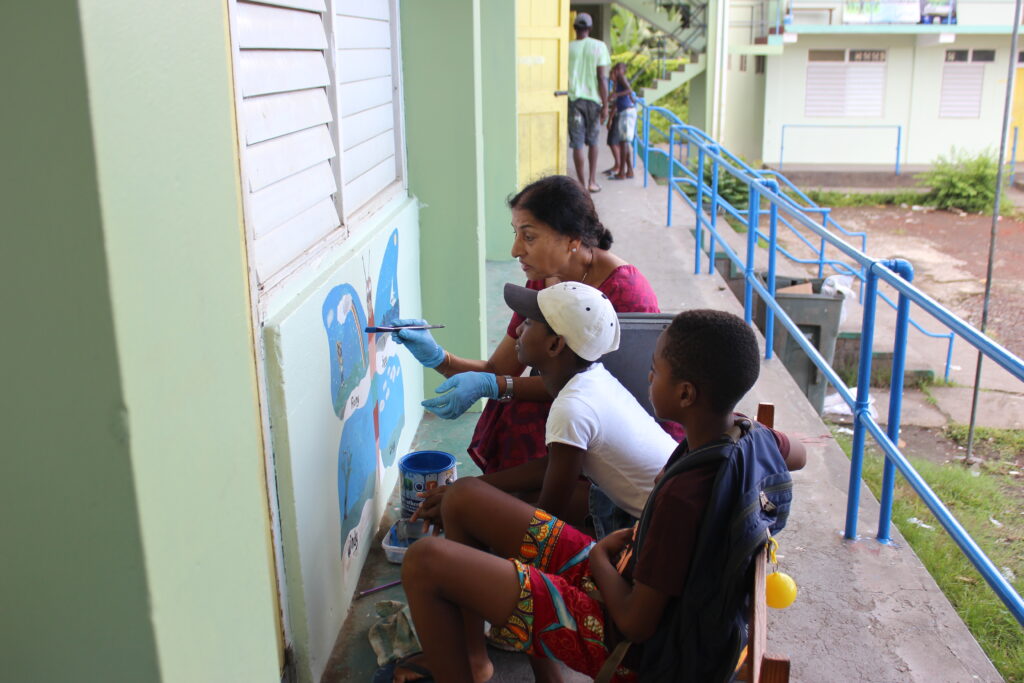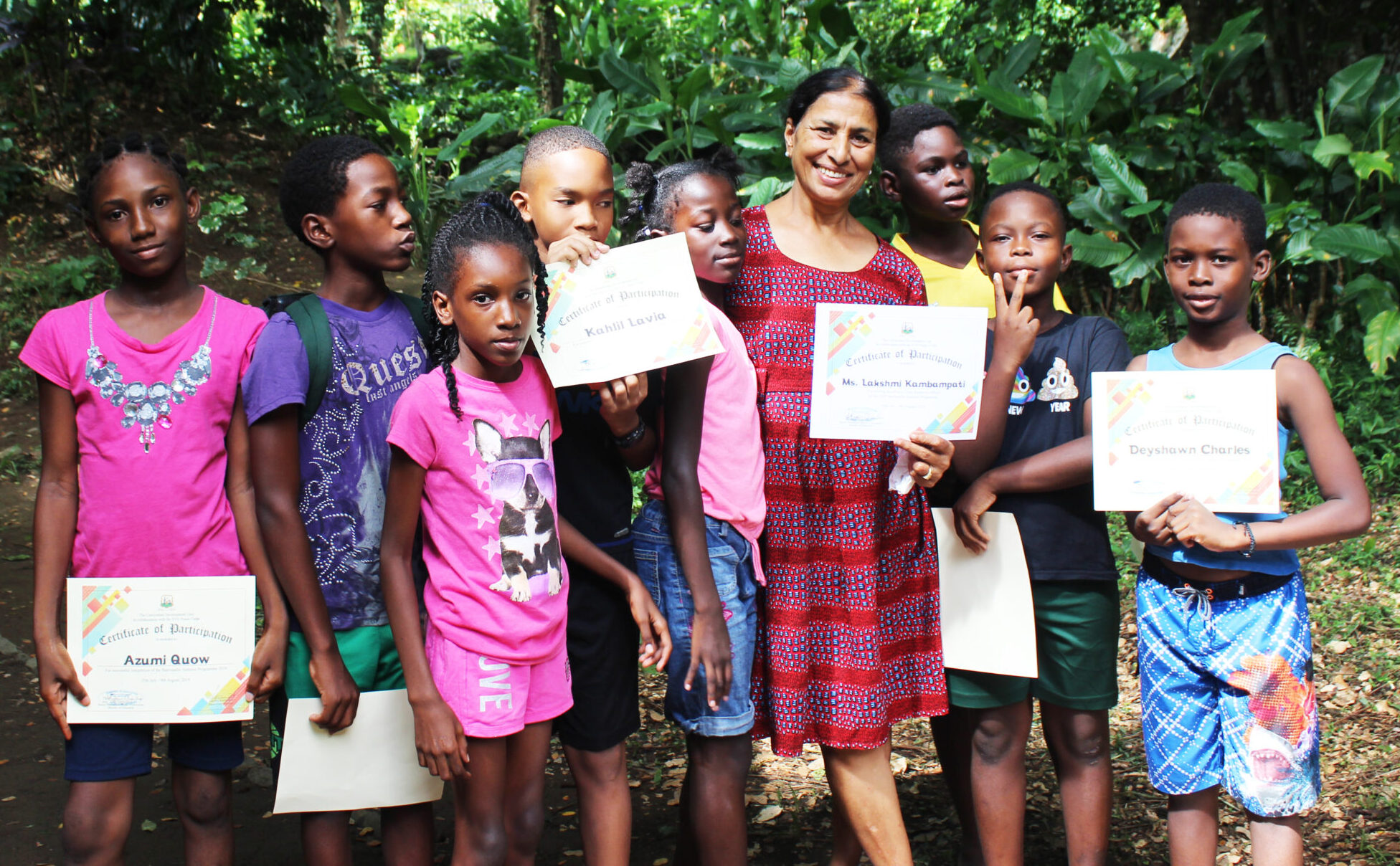
Shirley Stricker said her students in Papua New Guinea developed good posture by carrying books on their heads to class. 
Shirley Stricker 
Courtesy photo Lakshmi Kambampati painted murals with students in Liberia.
When Lakshmi Kambampati arrived in Liberia, the schools had been closed for 14 years due to Ebola and a civil war. It was just the kind of challenge the retired Wichita teacher was looking for when she signed up for the Peace Corps.
“I wanted to help and I was looking for adventure,” she said. “I trained the first batch of math teachers, and it was awesome. Everyone loved it.”
Kambampati is one of more than 240,000 Americans who have served abroad with the Peace Corps since President John F. Kennedy established the agency to promote international peace and friendship 60 years ago next month. Although originally intended for recent college graduates, the Peace Corps places no age limit on volunteers. Today, about 7 percent of volunteers are 50 and older.
Kambampati immigrated to the United States from India with her husband, Mohan, and their two sons. She taught mathematics in Wichita high schools for 19 years, then served as an adjunct professor at Butler Community College and Friends University. She was in her 60s when she joined the Peace Corps, serving in St. Vincent and the Grenadines, an island nation in the eastern Caribbean, in addition to Liberia.
In St. Vincent, she developed a math curriculum for the schools — and learned something herself as well. “I learned to be patient,” she said. “For example, at St. Vincent the internet connection was very erratic. It was not as fast as I am used to in the USA and also often it does not get connected.”
The relationship between Peace Corps workers and the communities they serve is one of two-way respect, she said.
“The Peace Corps staff at Kingstown and the curriculum team at the ministry of education of St. Vincent were so professional and helpful.”
“Our neighbors and the community kept a protective eye on us. They brought their home-grown tomatoes and avocados. The community knew that we were there to help them so they were very thankful for us.”
In Liberia, one student gave Kambampati a note she’ll treasure forever: “You are an inspirational trainer; I shall forever miss your loving care and kindness. Your presence in Liberia brought many changes in life.”
Wichitans Shirley and Bill Strickler volunteered for the Peace Corps as a couple. Shirley is a retired medical technologist and Bill an Air Force veteran.
“We decided to volunteer because we thought it was time to give something back for the good life we had enjoyed,” she explained. “We both loved to travel. Our youngest child had gone into the Peace Corps just after she graduated from KU. She spent two years in The Kingdom of Tonga and had a wonderful experience. We were now both 60 years old and in good health, so we volunteered.”
Shirley Strickler taught science classes in a high school on Misimi, a volcanic island in Papua New Guinea, in the Pacific Ocean north of Austraila. “I was also in charge of the students’ health. I diagnosed and treated from five to 25 cases of malaria every week.”
Life on Misima Island, located nearly 150 miles from the mainland, was not always easy.
“Although we had 24-hour electricity in our house, we had no running water,” she said. “You could not just run down to the store to pick up something. Supplies came to the island either by air, one flight per day, or by boat. I ordered food from a grocery on the mainland. Sometimes it would arrive in a week. Next time it would take six weeks.”
Strickler enjoyed learning about another culture. The Stricklers were the only two Americans on the island, although there were some Australians working to mine gold.
Robert Hite spent years as a reporter for the Parsons Sun, covering education, city hall, the police department and the courts. Since high school, he had wanted to volunteer for the Peace Corps, offering assistance in areas of the world where people most needed help.
“I went to Namibia from 2002 to 2004,” Hite, who now lives in Wichita, said. “My assignment was as a Parents and Communities for Education volunteer. My site was in Witvlei, at an elementary school in a small town of about 2,000 miles due east of Windhoek, the capital. My major projects were starting a chess program, collecting books for a library and an internship program.”
Noting that activities for students had previously been limited, Hite said some students competed in regional and national chess tournaments, and several became interested in medical careers after completing the internship program. The school’s library grew from 30 books to more than 1,500. Other projects included planting gardens and persuading Raleigh International, a charity active in remote, rural areas, to build a playground.
Hite also volunteered in the Ukraine, which he found more challenging, primarily due to the barrier presented by Russian, a difficult language to learn. In Nambia, a former English colony, most people spoke English.
“I worked at an organization for invalids and large families and another organization working to reduce the spread of HIV/AIDS,” he said of his time in the Ukraine. “This was a different experience. The culture is different by a lot. I felt like I got more done at the HIV Center than the other organizations. We went into schools and gave presentations about how HIV is spread and the importance of stopping it.”
Peace Corps volunteers are American citizens, typically with a college degree, who work abroad for a period of two years after three months of training. Volunteers work with governments, schools, nonprofit organizations, non-government organizations, and entrepreneurs in education, youth development, community health, business, information technology, agriculture and the environment. Peace Corps also has a program for retirees and senior professionals called Response Volunteer. This program is for a term of three months to 12 months.
Last March, due to the coronavirus pandemic, the Peace Corps announced it was temporarily suspending operations. All volunteers — numbering nearly 7,000 — were evacuated from their posts.
The Peace Corps will mark its 60th anniversary in March with a variety of virtual and online activities. For more information, visit https://www.peacecorps.gov/.
Kambampati, the Stricklers and Hite believe they took part, as Kennedy put it, “in the great common task of bringing man to that decent way of life which is the foundation of freedom and a condition of peace.”
‘This is how we connect and the impact we make,” Kambampati stresses. “This is my passion.”
Contact Debbi Elmore at
Debbi.Elmore2017@gmail.com









